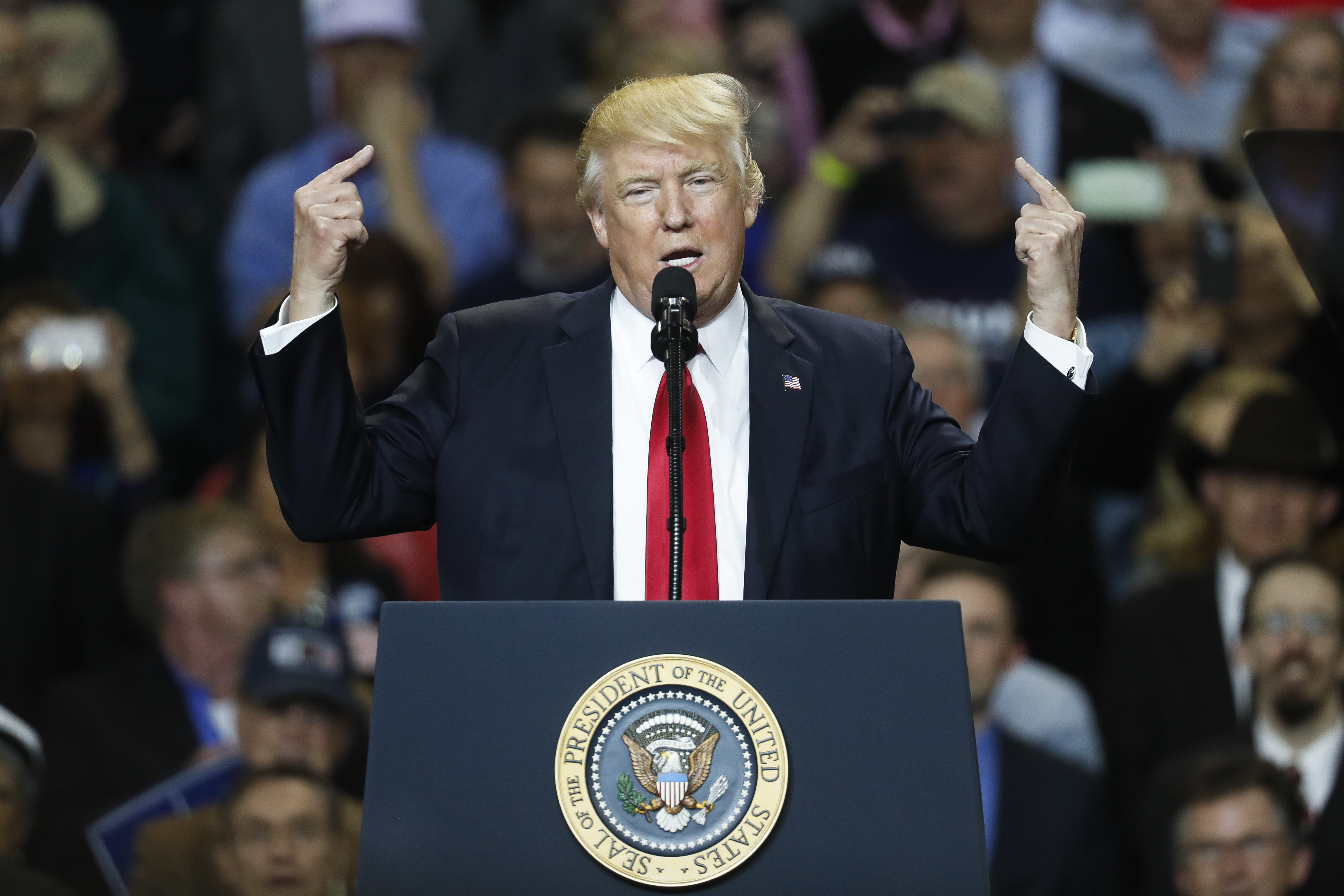Why President Trump's abysmal popularity rating won't hurt him
Gallup, shmallup. The Trump phenomenon is bigger than any middling poll results.


A free daily email with the biggest news stories of the day – and the best features from TheWeek.com
You are now subscribed
Your newsletter sign-up was successful
If you perked up at news this week that President Trump's approval rating had dipped to 37 percent, according to figures tracked by Gallup, you should un-perk.
The truth is, whether Trump is in the 30s or 40s — or even 20s or 50s — simply doesn't matter much. For those of us between the ages of 25 and 100 years old, this is going to take some getting used to.
We are accustomed to believing that a president needs to be popular to see his agenda become law. Presidents from Woodrow Wilson to George W. Bush used their political capital, the democratic legitimacy that is uniquely their own in presidential systems like ours, to marshal public support for, say, the League of Nations or the Iraq War. "We must remember that it is the president who sets the agenda for our government," former Speaker John Boehner said on Election Night 2010, when Republicans won control of the House in a historic shellacking of President Obama.
The Week
Escape your echo chamber. Get the facts behind the news, plus analysis from multiple perspectives.

Sign up for The Week's Free Newsletters
From our morning news briefing to a weekly Good News Newsletter, get the best of The Week delivered directly to your inbox.
From our morning news briefing to a weekly Good News Newsletter, get the best of The Week delivered directly to your inbox.
President Trump no doubt sees himself in this vein, too. That's one of the reasons he enjoys public rallies in red states so much: Trump desperately wants to be a popular president in the traditional sense. But that is clearly not how our government is behaving right now. It is behaving more like a parliamentary democracy.
Indulge, if you a will, a brief detour into political science. During the implacable partisan gridlock of the Obama years, center-left writers like Matthew Yglesias revived an argument made by the late Juan J. Linz that presidential systems are uniquely given to constitutional crises. Unlike in parliamentary democracies, where prime ministers derive their authority from the legislature, a president of an opposing party may legitimately claim to represent the people as much as lawmakers themselves. The result? Destabilizing gridlock.
New York's Jonathan Chait, meanwhile, argued that America had historically handled such competing claims of legitimacy just fine — until, that is, one of our two major parties was captured by a splinter group defined by an unusually virulent (from the point of view of other advanced democracies) strain of antigovernment ideology.
Without attempting to settle this question, let me introduce a new one: What if our system is mutating into a new hybrid of presidentialism and parliamentarism? Consider, in this light, Trump's meager approval rating not as a standalone public measure of his performance, but rather as a chunk of rock-solid support that he brings to the Republican Party. All of a sudden, it's not that his approval rating is only 37 percent — it's that tens of millions of Americans — a full 37 percent of the country! — are lining up behind him.
A free daily email with the biggest news stories of the day – and the best features from TheWeek.com
To understand why this is more than statistical sleight of hand, let's dispense for a moment with the idea that there is a singular entity called the "Republican Party."
As my colleague Michael Brendan Dougherty writes, today's GOP is better seen as a union of various factions: tax-cutting fanatics like Paul Ryan, internationalist hawks like John McCain, "constitutional conservatives" like Rand Paul, and populist-nationalists like Stephen Bannon. These various strands of rightism last year reached an uneasy modus vivendi: We will deliver X-number of white working-class Democrats; in return you will downplay your commitment to free trade and cheap labor. You can have your tax cuts for the wealthy and possibly a Supreme Court majority to overturn Roe v. Wade.
In parliamentary lingo, when representatives from various parties strike such a bargain, it's called forming a government. The forging of such coalitions is hardly foreign to our presidential system. The difference is that such bargaining used to take place within and across our two major parties — in concert as well as in tension with the executive branch of government. Before they went extinct, there were liberal northeastern Republicans and conservative southern Democrats; they would hold unruly and fractious national conventions in search of consensus presidential candidates. They would routinely create bipartisan legislative majorities on everything from civil rights to tax cuts to welfare reform.
Those days appear to be over. The variegated beast known as the Republican Party has formed a government and, as in a parliamentary system, it's the leaders of the winning party who have determined which priorities the government will pursue, and in what order. And because President Trump has thus far obediently behaved like a member of a parliamentary coalition, rather than an actor with his own agency and source of legitimacy, the leaders of the legislature report a "high level of satisfaction" with his administration. His tweeting, his executive-order photo-ops, his pissant job-rescue operations in Indiana and Michigan: They are but sound and fury next to the real, substantive action on Capitol Hill.
This could all blow up in their faces, of course. But if it does, it won't be due to Trump's unpopularity. It will be due to unbridgeable divisions within the Republican Party coalition. Unlike in parliamentary systems, however, neither Republicans, Democrats, nor the public at large can get rid of our head of state via "no confidence" or "loss of supply" parliamentary votes. We have to wait an interminable-seeming four years for that.
Scott Galupo is a freelance writer living in Virginia. In addition to The Week, he blogs for U.S. News and reviews live music for The Washington Post. He was formerly a senior contributor to the American Conservative and staff writer for The Washington Times. He was also an aide to Rep. John Boehner. He lives with his wife and two children and writes about politics to support his guitar habit.
-
 Political cartoons for February 20
Political cartoons for February 20Cartoons Friday’s political cartoons include just the ice, winter games, and more
-
 Sepsis ‘breakthrough’: the world’s first targeted treatment?
Sepsis ‘breakthrough’: the world’s first targeted treatment?The Explainer New drug could reverse effects of sepsis, rather than trying to treat infection with antibiotics
-
 James Van Der Beek obituary: fresh-faced Dawson’s Creek star
James Van Der Beek obituary: fresh-faced Dawson’s Creek starIn The Spotlight Van Der Beek fronted one of the most successful teen dramas of the 90s – but his Dawson fame proved a double-edged sword
-
 The billionaires’ wealth tax: a catastrophe for California?
The billionaires’ wealth tax: a catastrophe for California?Talking Point Peter Thiel and Larry Page preparing to change state residency
-
 Bari Weiss’ ‘60 Minutes’ scandal is about more than one report
Bari Weiss’ ‘60 Minutes’ scandal is about more than one reportIN THE SPOTLIGHT By blocking an approved segment on a controversial prison holding US deportees in El Salvador, the editor-in-chief of CBS News has become the main story
-
 Has Zohran Mamdani shown the Democrats how to win again?
Has Zohran Mamdani shown the Democrats how to win again?Today’s Big Question New York City mayoral election touted as victory for left-wing populists but moderate centrist wins elsewhere present more complex path for Democratic Party
-
 Millions turn out for anti-Trump ‘No Kings’ rallies
Millions turn out for anti-Trump ‘No Kings’ ralliesSpeed Read An estimated 7 million people participated, 2 million more than at the first ‘No Kings’ protest in June
-
 Ghislaine Maxwell: angling for a Trump pardon
Ghislaine Maxwell: angling for a Trump pardonTalking Point Convicted sex trafficker's testimony could shed new light on president's links to Jeffrey Epstein
-
 The last words and final moments of 40 presidents
The last words and final moments of 40 presidentsThe Explainer Some are eloquent quotes worthy of the holders of the highest office in the nation, and others... aren't
-
 The JFK files: the truth at last?
The JFK files: the truth at last?In The Spotlight More than 64,000 previously classified documents relating the 1963 assassination of John F. Kennedy have been released by the Trump administration
-
 'Seriously, not literally': how should the world take Donald Trump?
'Seriously, not literally': how should the world take Donald Trump?Today's big question White House rhetoric and reality look likely to become increasingly blurred
